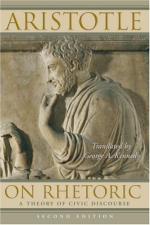
|
| Name: _________________________ | Period: ___________________ |
This quiz consists of 5 multiple choice and 5 short answer questions through Book I, Chapters 10-15.
Multiple Choice Questions
1. What was another word used for "legal" in Aristotle's discussion of legal rhetoric?
(a) Lawful.
(b) Political.
(c) Forensic.
(d) Civil.
2. Which one of the following could be an example of the emotional appeal?
(a) Making the audience think about a different point of view.
(b) Making the audience tired of listening to the speech.
(c) Making the audience angry to fight a war.
(d) Making the audience doubt their own point of view.
3. How did Aristotle define that which is unpleasant?
(a) The opposite to certain things that have been determined to be pleasant.
(b) The opposite of good.
(c) The opposite of pleasure.
(d) The opposite to any of the things that have been determined to be pleasant.
4. What description of the ethical appeal was given by Aristotle?
(a) Appeal to the speaker's intent.
(b) Appeal to the speaker's past.
(c) Appeal to the speaker's associations.
(d) Appeal to the speaker's character.
5. Which of the following did Aristotle think were more likely to commit crimes?
(a) Weak people.
(b) Ignorant people.
(c) Malicious people.
(d) Clever people.
Short Answer Questions
1. Which tactic was not included as something that an epideictic rhetorician might use?
2. In Aristotle's opinion, which things did a criminal consider when choosing their victim?
3. Why did Aristotle think the completion of a difficult task was pleasant?
4. Which of the following would be considered an ideal target for a crime?
5. Concerning the elicitation of the praise or blame of an audience, what was epideictic rhetoric also called by Aristotle?
|
This section contains 319 words (approx. 2 pages at 300 words per page) |

|




